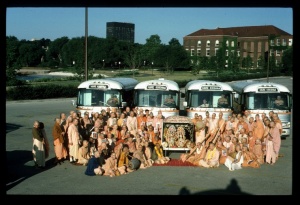CC Madhya 20.311: Difference between revisions
m (1 revision(s)) |
(Vanibot #0054 edit - transform synonyms into clickable links, which search similar occurrences) |
||
| (One intermediate revision by one other user not shown) | |||
| Line 1: | Line 1: | ||
{{ | [[Category:Sri Caitanya-caritamrta - Madhya-lila Chapter 20|C311]] | ||
<div style="float:left">'''[[Sri Caitanya-caritamrta|Śrī Caitanya-caritāmṛta]] - [[CC Madhya|Madhya-līlā]] - [[CC Madhya 20|Chapter 20: Lord Śrī Caitanya Mahāprabhu Instructs Sanātana Gosvāmī in the Science of the Absolute Truth]]'''</div> | |||
<div style="float:right">[[File:Go-previous.png|link=CC Madhya 20.310|Madhya-līlā 20.310]] '''[[CC Madhya 20.310|Madhya-līlā 20.310]] - [[CC Madhya 20.312|Madhya-līlā 20.312]]''' [[File:Go-next.png|link=CC Madhya 20.312|Madhya-līlā 20.312]]</div> | |||
{{CompareVersions|CC|Madhya 20.311|CC 1975|CC 1996}} | |||
{{RandomImage}} | |||
==== TEXT 311 ==== | ==== TEXT 311 ==== | ||
<div | <div class="verse"> | ||
‘śiva’—māyā-śakti-saṅgī, tamo-guṇāveśa | :‘śiva’—māyā-śakti-saṅgī, tamo-guṇāveśa | ||
māyātīta, guṇātīta ‘viṣṇu’—parameśa | :māyātīta, guṇātīta ‘viṣṇu’—parameśa | ||
</div> | </div> | ||
| Line 12: | Line 16: | ||
==== SYNONYMS ==== | ==== SYNONYMS ==== | ||
<div | <div class="synonyms"> | ||
''[//vanipedia.org/wiki/Special:VaniSearch?s=śiva&tab=syno_o&ds=1 śiva]'' — Lord Śiva; ''[//vanipedia.org/wiki/Special:VaniSearch?s=māyā&tab=syno_o&ds=1 māyā]-[//vanipedia.org/wiki/Special:VaniSearch?s=śakti&tab=syno_o&ds=1 śakti]-[//vanipedia.org/wiki/Special:VaniSearch?s=saṅgī&tab=syno_o&ds=1 saṅgī]'' — an associate of the external energy; ''[//vanipedia.org/wiki/Special:VaniSearch?s=tamaḥ&tab=syno_o&ds=1 tamaḥ]-[//vanipedia.org/wiki/Special:VaniSearch?s=guṇa&tab=syno_o&ds=1 guṇa]-[//vanipedia.org/wiki/Special:VaniSearch?s=āveśa&tab=syno_o&ds=1 āveśa]'' — absorbed by the quality of ignorance; ''[//vanipedia.org/wiki/Special:VaniSearch?s=māyā&tab=syno_o&ds=1 māyā]-[//vanipedia.org/wiki/Special:VaniSearch?s=atīta&tab=syno_o&ds=1 atīta]'' — transcendental to the external energy; ''[//vanipedia.org/wiki/Special:VaniSearch?s=guṇa&tab=syno_o&ds=1 guṇa]-[//vanipedia.org/wiki/Special:VaniSearch?s=atīta&tab=syno_o&ds=1 atīta]'' — transcendental to the qualities of matter; ''[//vanipedia.org/wiki/Special:VaniSearch?s=viṣṇu&tab=syno_o&ds=1 viṣṇu]'' — Viṣṇu; ''[//vanipedia.org/wiki/Special:VaniSearch?s=parama&tab=syno_o&ds=1 parama]-[//vanipedia.org/wiki/Special:VaniSearch?s=īśa&tab=syno_o&ds=1 īśa]'' — the Supreme Lord. | |||
</div> | </div> | ||
| Line 19: | Line 23: | ||
==== TRANSLATION ==== | ==== TRANSLATION ==== | ||
<div | <div class="translation"> | ||
“Lord Śiva is an associate of the external energy; therefore he is absorbed in the material quality of darkness. Lord Viṣṇu is transcendental to māyā and the qualities of māyā. Therefore He is the Supreme Personality of Godhead. | “Lord Śiva is an associate of the external energy; therefore he is absorbed in the material quality of darkness. Lord Viṣṇu is transcendental to māyā and the qualities of māyā. Therefore He is the Supreme Personality of Godhead. | ||
</div> | </div> | ||
| Line 26: | Line 30: | ||
==== PURPORT ==== | ==== PURPORT ==== | ||
<div | <div class="purport"> | ||
Viṣṇu is beyond the range of the material manifestation, and He is not within the control of the material energy. He is the supreme independent Personality of Godhead. This is admitted even by Śaṅkarācārya: nārāyaṇaḥ paro ’vyaktāt (Gītā-bhāṣya). In his constitutional form, Śiva is a mahā-bhāgavata, a supreme devotee of the Lord, but because he accepts māyā’s association—especially the quality of ignorance—he is not free from māyā’s influence. Such an intimate association is completely absent in the Supreme Personality of Godhead, Viṣṇu. Lord Śiva accepts māyā, but in the presence of Lord Viṣṇu, māyā does not exist. Consequently Lord Śiva has to be considered a product of māyā. When Lord Śiva is free from māyā’s influence, he is in the position of a mahā-bhāgavata, a supreme devotee of Lord Viṣṇu. Vaiṣṇavānāṁ yathā śambhuḥ. | Viṣṇu is beyond the range of the material manifestation, and He is not within the control of the material energy. He is the supreme independent Personality of Godhead. This is admitted even by Śaṅkarācārya: ''nārāyaṇaḥ paro ’vyaktāt'' (''Gītā-bhāṣya''). In his constitutional form, Śiva is a ''mahā-bhāgavata'', a supreme devotee of the Lord, but because he accepts ''māyā’s'' association—especially the quality of ignorance—he is not free from ''māyā’s'' influence. Such an intimate association is completely absent in the Supreme Personality of Godhead, Viṣṇu. Lord Śiva accepts ''māyā'', but in the presence of Lord Viṣṇu, ''māyā'' does not exist. Consequently Lord Śiva has to be considered a product of ''māyā''. When Lord Śiva is free from ''māyā’s'' influence, he is in the position of a ''mahā-bhāgavata'', a supreme devotee of Lord Viṣṇu. ''Vaiṣṇavānāṁ yathā śambhuḥ''. | ||
</div> | </div> | ||
__NOTOC__ | |||
<div style="float:right; clear:both;">[[File:Go-previous.png|link=CC Madhya 20.310|Madhya-līlā 20.310]] '''[[CC Madhya 20.310|Madhya-līlā 20.310]] - [[CC Madhya 20.312|Madhya-līlā 20.312]]''' [[File:Go-next.png|link=CC Madhya 20.312|Madhya-līlā 20.312]]</div> | |||
__NOTOC__ | |||
__NOEDITSECTION__ | |||
Latest revision as of 22:42, 19 February 2024

A.C. Bhaktivedanta Swami Prabhupada
TEXT 311
- ‘śiva’—māyā-śakti-saṅgī, tamo-guṇāveśa
- māyātīta, guṇātīta ‘viṣṇu’—parameśa
SYNONYMS
śiva — Lord Śiva; māyā-śakti-saṅgī — an associate of the external energy; tamaḥ-guṇa-āveśa — absorbed by the quality of ignorance; māyā-atīta — transcendental to the external energy; guṇa-atīta — transcendental to the qualities of matter; viṣṇu — Viṣṇu; parama-īśa — the Supreme Lord.
TRANSLATION
“Lord Śiva is an associate of the external energy; therefore he is absorbed in the material quality of darkness. Lord Viṣṇu is transcendental to māyā and the qualities of māyā. Therefore He is the Supreme Personality of Godhead.
PURPORT
Viṣṇu is beyond the range of the material manifestation, and He is not within the control of the material energy. He is the supreme independent Personality of Godhead. This is admitted even by Śaṅkarācārya: nārāyaṇaḥ paro ’vyaktāt (Gītā-bhāṣya). In his constitutional form, Śiva is a mahā-bhāgavata, a supreme devotee of the Lord, but because he accepts māyā’s association—especially the quality of ignorance—he is not free from māyā’s influence. Such an intimate association is completely absent in the Supreme Personality of Godhead, Viṣṇu. Lord Śiva accepts māyā, but in the presence of Lord Viṣṇu, māyā does not exist. Consequently Lord Śiva has to be considered a product of māyā. When Lord Śiva is free from māyā’s influence, he is in the position of a mahā-bhāgavata, a supreme devotee of Lord Viṣṇu. Vaiṣṇavānāṁ yathā śambhuḥ.